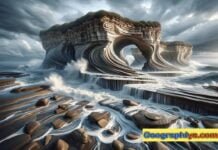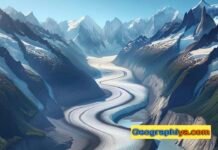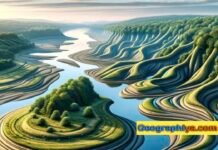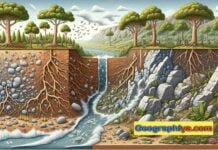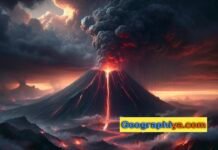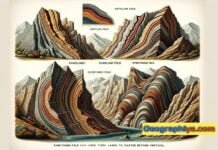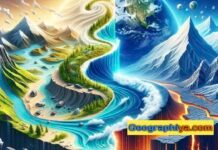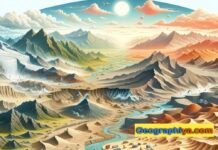Topography created by sea waves
Introduction to Ocean Topography:Ocean topography refers to the varied and dynamic landscape of the sea floor, encompassing a wide array of underwater mountains, valleys,...
Topography created by glaciers
Introduction to glaciersA glacier is a large, persistent mass of ice that forms from the accumulation and compaction of snow over long periods of...
Landforms created by wind
The force of wind, acting as a sculptor, continuously modifies and transforms the Earth's surface through a geological process called aeolian erosion. This phenomenon...
Landforms created by rivers
Introduction to River Landforms
Rivers form landforms as they flow over Earth. These landforms change with erosion, transportation, and deposition. Rivers form everything from tiny...
Earthquake and Types of earthquake
Overview
One of the most potent natural phenomena on Earth, earthquakes are defined as abrupt, strong shakings of the ground that frequently result in extensive...
Introduction to Weathering and Erosion
Introduction to Weathering and Erosion
Weathering and erosion are fundamental geological processes that shape the Earth's landscape. They are responsible for the formation of soil,...
Volcano, Types of volcano, Distribution
1. Introduction to Volcanoes
One of the most amazing and potent natural phenomena on Earth are volcanoes. These are geological formations produced when magma from...
Types of folds in geography
Folds are bends in rock layers that occur due to external pressures and can vary widely in size, shape, and complexity. Here are the...
Endogenic and Exogenic forces
Endogenic forces are subterranean internal processes or reactions that are mostly caused by the planet's internal heat. Through processes like plate tectonics, earthquakes, orogeny...
Introduction to Geomorphology
1. Introduction to Geomorphology:
The scientific study of landforms and the mechanisms sculpting the Earth's surface is known as geomorphology. Geomorphology, which derives from...

